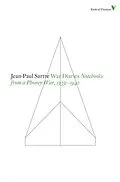During the phony war that preceded the invasion of France, between late 1939 and the summer of 1940, the young Jean-Paul Sartre was stationed in his native Alsace as part of a meteorological unit. He used his considerable periods of spare time, between mundane duties like watching weather balloons, to make a series of notes on philosophy, literature, politics, history and autobiography that anticipate the themes of his later masterpieces, and often surpass them in literary verve and directness. These War Diaries form a portrait of Sartre in his most intense and brilliant phase. With them the twentieth century's most remarkable and public philosopher has provided us with a fitting posthumous monument to his honest and creativity.
Autorentext
Jean-Paul Sartre was a philosopher, novelist, public intellectual, biographer, playwright and founder of the journal Les Temps modernes. Born in Paris in 1905, Sartre was awarded the Nobel Prize for Literature in 1964 - and turned it down. His books include Nausea, Intimacy, The Flies, No Exit, The Freud Scenario, War Diaries, Critique of Dialectical Reason, and the monumental treatise Being and Nothingness. He died in 1980.
